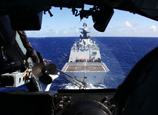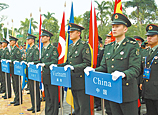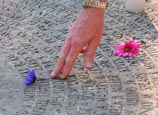
Shenzhou-9 spacecraft successfully landing
Astronauts receive brief interview
More Information about Shenzhou-9 mission
The experiment, the first of its kind in China, is extremely important for the long-term development of China's manned space program, Deng added.
The cabin, a controlled ecological life support system (CELSS) built in 2011, is a model of China's third generation of astronauts' life support systems, which is expected to be used in extraterrestrial bases on the Moon or Mars.
The introduction of a CELSS seeks to provide sustainable supplies of air, water and food for astronauts with the help of plants and algae, instead of relaying on stocks of such basics deposited on board at the outset of the mission.
Advance forms of CELSS also involve the breeding of animals for meat and using microbes to recycle wastes.
Scientists from Germany also participated in the experiments.

















![]()
